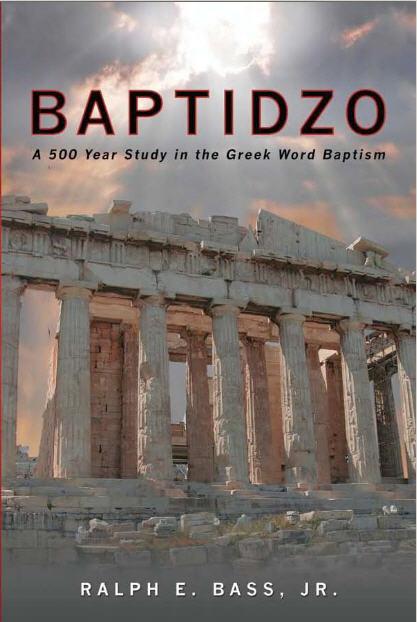
Hi, My Name Is Ralph Bass...This Is My Library


In studying Baptism we must ask, how is word meaning determined? It is surely a fact that dictionaries and lexicons cite many confusing choices as definitions of Baptidzo, some are acts and others are states, results or conditions. Dip and plunge, for instance, are very diverse acts, not to speak of sprinkle or pour. What is our obligation to lexicons? Alexander Carson, the Baptist writer, says this of lexicons (when they disagree with him):
“Many may be startled at the idea of refusing to submit to the unanimous authority of lexicons, as an instance of the boldest skepticism. Are lexicons, it may be said, of no authority? Now, I admit that lexicons are an authority, but they are not an ultimate authority. Lexicographers have been guided by their own judgment in examining the various passages in which a word occurs; and it is still
“Many may be startled at the idea of refusing to submit to the unanimous authority of lexicons, as an instance of the boldest skepticism. Are lexicons, it may be said, of no authority? Now, I admit that lexicons are an authority, but they are not an ultimate authority. Lexicographers have been guided by their own judgment in examining the various passages in which a word occurs; and it is still

Subscribe to this Site
History of Baptism
competent for every man to have recourse to the same sources. The meaning of a word must be determined by an actual inspection of the passages in which it occurs, as often as any one chooses to dispute the judgment of the lexicographer.”
Of course, he is correct in this conclusion of his. So, again, how are the meanings of words authoritatively determined? The answer to that question is this: the definition of words is demonstrated and thereby determined by their use in language, or usus loquendi. In other words, dictionaries, like you and I, must determine how words are used in the literature of the language in order to define them. That is what we will do in the pages ahead.
PRIMARY SOURCE DOCUMENTS
At this point I would like to point out to the reader that this work is an analysis of primary source documents. We will not often ask what various pastors or theologians had to say about baptism. We will however ask how Aristotle, Plutarch, Strabo, Aesop, Hippocrates, Homer, Plotinus, The Septuagint, The Apocrypha, The Pseudepigrapha. Philo of Alexandria, Josephus
Of course, he is correct in this conclusion of his. So, again, how are the meanings of words authoritatively determined? The answer to that question is this: the definition of words is demonstrated and thereby determined by their use in language, or usus loquendi. In other words, dictionaries, like you and I, must determine how words are used in the literature of the language in order to define them. That is what we will do in the pages ahead.
PRIMARY SOURCE DOCUMENTS
At this point I would like to point out to the reader that this work is an analysis of primary source documents. We will not often ask what various pastors or theologians had to say about baptism. We will however ask how Aristotle, Plutarch, Strabo, Aesop, Hippocrates, Homer, Plotinus, The Septuagint, The Apocrypha, The Pseudepigrapha. Philo of Alexandria, Josephus
Let's Look Inside
the Book

and a multitude of other authors and primary source documents used Baptidzo. It is from these and other similar sources that we must extract our understanding of this word. It is simply not adequate for someone to say “in classical Greek we find such and such.” Where in classical Greek do we find this? Who said it? What was the context? As a result, what conclusion can we draw? This is how meaning is determined. This is called philology-the science of the meaning of words.
There will be no end to the opinions of various preachers on this subject. But, in fact, it is only the ancient sources that can demonstrate authoritative usage. Having determined what the ancients have to say, we will let our contemporaries hash and rehash the arguments and opinions of others.
The issue is decided here—at the primary source level.
There will be no end to the opinions of various preachers on this subject. But, in fact, it is only the ancient sources that can demonstrate authoritative usage. Having determined what the ancients have to say, we will let our contemporaries hash and rehash the arguments and opinions of others.
The issue is decided here—at the primary source level.

How is Word Meaning Established?












































































































